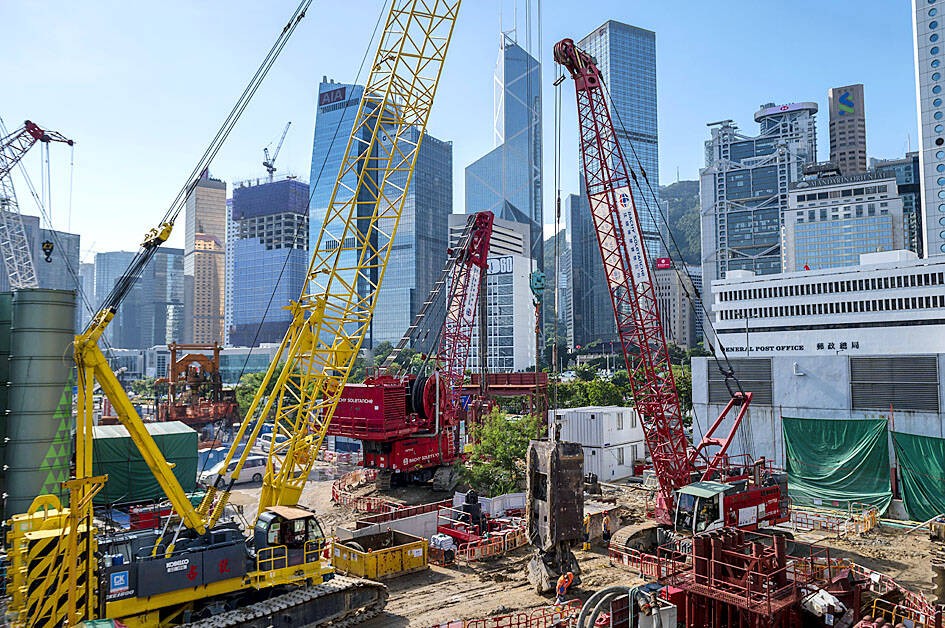A Hong Kong court has issued an order that a Chinese developer’s unit that defaulted on offshore debt be wound up, the first such instance against a major builder during the country’s property-debt crisis and opening the door to more such decisions.
The order regarding Yango Justice International Ltd (陽光城嘉世國際) was dated Monday last week, according to a winding-up search report done through the Web site of Hong Kong’s Official Receiver’s Office.
The case’s first hearing date was Sept. 14 and the adjourned hearing was on Monday last week, the same day of the order. The firm is a unit of Yango Group Co (陽光城集團).

Photo: AP
Hong Kong has acted as a gateway for investors to access China’s high-yield credit, a market dominated by builders, but which has slid into unprecedented distress this year, reversing what was once one of the world’s most lucrative debt trades.
The tumble comes as China grapples with a real-estate crisis fueled in part by a clampdown started in 2020 on excessive borrowing by property firms and speculation by home buyers. Some builders have left projects unfinished as they struggle to pay suppliers and creditors, causing defaults to surge.
That has sparked a flurry of winding-up petitions filed in Hong Kong or Cayman Islands courts against developers, including China Evergrande Group (恒大集團) — the giant whose default on US dollar notes in late last year exacerbated the broader industry crisis.
Evergrande has said that it is pushing forward offshore debt restructuring work with its financial and legal advisers.
Creditors file winding-up petitions when they get frustrated with the lack of restructuring progress at a firm, fixed-income research analysts at BOC International Holdings Ltd (中銀國際) including Wu Qiong (吳瓊) wrote in an Oct. 13 report.
“In most cases, creditors seek more serious negotiations with the debtor by putting the debtor company under pressure or a solution through the court process,” they said.
If a Hong Kong court gives a winding-up order and appoints a provisional liquidator, the latter takes control of the firm in question and disposes of realizable assets, according to an explanation posted on the Official Receiver’s Office Web site.
Any remaining funds are distributed to creditors whose claims have been admitted.
Yango Justice defaulted for the first time in February when it missed paying US$27.3 million of interest on two US dollar bonds within a 30-day grace period, capping months of debt struggles that included seeking payment extensions.
Parent Yango Group disclosed a winding-up petition against its unit in July involving an US$8.5 million payment for offshore notes and said it “strongly” opposed the filing.

In Italy’s storied gold-making hubs, jewelers are reworking their designs to trim gold content as they race to blunt the effect of record prices and appeal to shoppers watching their budgets. Gold prices hit a record high on Thursday, surging near US$5,600 an ounce, more than double a year ago as geopolitical concerns and jitters over trade pushed investors toward the safe-haven asset. The rally is putting undue pressure on small artisans as they face mounting demands from customers, including international brands, to produce cheaper items, from signature pieces to wedding rings, according to interviews with four independent jewelers in Italy’s main

Macronix International Co (旺宏), the world’s biggest NOR flash memory supplier, yesterday said it would spend NT$22 billion (US$699.1 million) on capacity expansion this year to increase its production of mid-to-low-density memory chips as the world’s major memorychip suppliers are phasing out the market. The company said its planned capital expenditures are about 11 times higher than the NT$1.8 billion it spent on new facilities and equipment last year. A majority of this year’s outlay would be allocated to step up capacity of multi-level cell (MLC) NAND flash memory chips, which are used in embedded multimedia cards (eMMC), a managed

Japanese Prime Minister Sanae Takaichi has talked up the benefits of a weaker yen in a campaign speech, adopting a tone at odds with her finance ministry, which has refused to rule out any options to counter excessive foreign exchange volatility. Takaichi later softened her stance, saying she did not have a preference for the yen’s direction. “People say the weak yen is bad right now, but for export industries, it’s a major opportunity,” Takaichi said on Saturday at a rally for Liberal Democratic Party candidate Daishiro Yamagiwa in Kanagawa Prefecture ahead of a snap election on Sunday. “Whether it’s selling food or

In the wake of strong global demand for AI applications, Taiwan’s export-oriented economy accelerated with the composite index of economic indicators flashing the first “red” light in December for one year, indicating the economy is in booming mode, the National Development Council (NDC) said yesterday. Moreover, the index of leading indicators, which gauges the potential state of the economy over the next six months, also moved higher in December amid growing optimism over the outlook, the NDC said. In December, the index of economic indicators rose one point from a month earlier to 38, at the lower end of the “red” light.